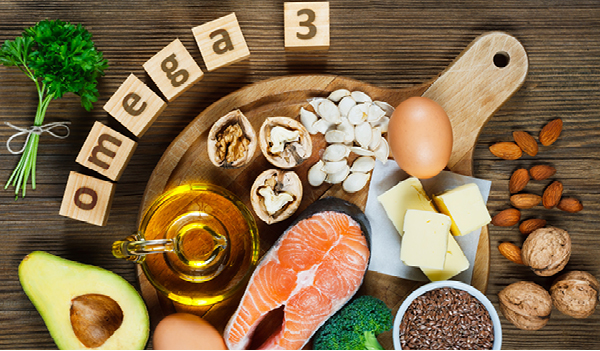Omega-3 fatty acids are essential fats that play a crucial role in maintaining overall health and well-being. These fatty acids are not produced by the body and must be obtained from the diet. Omega-3s are known for their numerous health benefits, including supporting heart health, brain function, and reducing inflammation. Incorporating omega-3 rich foods into your diet is an excellent way to ensure you’re getting an adequate intake of this essential nutrient.
- Fatty Fish:
- Fatty fish such as salmon, mackerel, sardines, trout, and herring are among the best sources of omega-3 fatty acids, particularly EPA (eicosapentaenoic acid) and DHA (docosahexaenoic acid).
- These fatty acids are essential for heart health, as they help reduce inflammation, lower blood pressure, and improve cholesterol levels.
- Fatty fish are also rich in protein, vitamins, and minerals, making them an excellent addition to a healthy diet.
- Flaxseeds:
- Flaxseeds are one of the best plant-based sources of alpha-linolenic acid (ALA), a type of omega-3 fatty acid.
- ALA is converted into EPA and DHA in the body, although the conversion rate is relatively low.
- Flaxseeds are also rich in fiber, lignans, and antioxidants, making them a nutritious addition to your diet.
- Chia Seeds:
- Chia seeds are another excellent plant-based source of ALA omega-3 fatty acids.
- These tiny seeds are also rich in fiber, protein, vitamins, minerals, and antioxidants.
- Adding chia seeds to your diet is an easy way to increase your omega-3 intake and support overall health.
- Walnuts:
- Walnuts are one of the best nut sources of ALA omega-3 fatty acids.
- In addition to omega-3s, walnuts are rich in protein, fiber, vitamins, minerals, and antioxidants.
- Adding a handful of walnuts to your diet each day is a simple way to boost your omega-3 intake and support heart and brain health.
- Hemp Seeds:
- Hemp seeds are a complete protein source and an excellent plant-based source of omega-3 fatty acids.
- These nutritious seeds are also rich in fiber, vitamins, minerals, and antioxidants.
- Adding hemp seeds to smoothies, salads, or yogurt is an easy way to increase your omega-3 intake and support overall health.
- Seaweed and Algae:
- Seaweed and algae are unique plant sources of EPA and DHA omega-3 fatty acids.
- These marine-based omega-3s are especially beneficial for vegetarians and vegans who may not consume fatty fish.
- Incorporating seaweed and algae into your diet can help ensure you’re getting an adequate intake of omega-3 fatty acids to support heart and brain health.
Conclusion
Omega-3 fatty acids play a crucial role in maintaining overall health and well-being, and incorporating omega-3 rich foods into your diet is an excellent way to ensure you’re getting an adequate intake of this essential nutrient.
Whether you prefer fatty fish, flaxseeds, chia seeds, walnuts, hemp seeds, or seaweed and algae, there are plenty of delicious and nutritious options to choose from.
By including omega-3 rich foods in your diet regularly, you can support heart health, brain function, and reduce inflammation, helping you feel your best and live a longer, healthier life.

Leave feedback about this